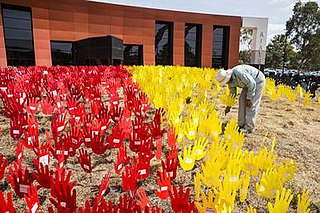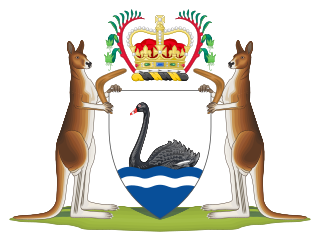Related Research Articles

The New South Wales Legislative Assembly is the lower of the two houses of the Parliament of New South Wales, an Australian state. The upper house is the New South Wales Legislative Council. Both the Assembly and Council sit at Parliament House in the state capital, Sydney. The Assembly is presided over by the Speaker of the Legislative Assembly.

The Australian Human Rights Commission is the national human rights institution of Australia, established in 1986 as the Human Rights and Equal Opportunity Commission (HREOC) and renamed in 2008. It is a statutory body funded by, but operating independently of, the Australian Government. It is responsible for investigating alleged infringements of Australia's anti-discrimination legislation in relation to federal agencies.
Web accessibility, or eAccessibility, is the inclusive practice of ensuring there are no barriers that prevent interaction with, or access to, websites on the World Wide Web by people with physical disabilities, situational disabilities, and socio-economic restrictions on bandwidth and speed. When sites are correctly designed, developed and edited, more users have equal access to information and functionality.
A conclusive presumption, also known as an irrebuttable presumption, is a type of presumption used in several legal systems. In English law, a conclusive presumption is a presumption of law that cannot be rebutted by evidence and must be taken to be the case whatever the evidence to the contrary. For example, a child below the age of criminal responsibility is presumed to be incapable of committing a felony.

The Australian Institute of Aboriginal and Torres Strait Islander Studies (AIATSIS), established as the Australian Institute of Aboriginal Studies (AIAS) in 1964, is an independent Australian Government statutory authority. It is a collecting, publishing and research institute and is considered to be Australia's premier resource for information about the cultures and societies of Aboriginal and Torres Strait Islander peoples. The institute is a leader in ethical research and the handling of culturally sensitive material and holds in its collections many unique and irreplaceable items of cultural, historical and spiritual significance. The collection at AIATSIS has been built through over 50 years of research and engagement with Aboriginal and Torres Strait Islander communities and is now a source of language and culture revitalisation, native title research and family and community history. AIATSIS is located on Acton Peninsula in Canberra, Australian Capital Territory.
The Australian Law Reform Commission is an Australian independent statutory body established to conduct reviews into the law of Australia. The reviews, also called inquiries or references, are referred to the ALRC by the Attorney-General for Australia. Based on its research and consultations throughout an inquiry, the ALRC makes recommendations to government so that government can make informed decisions about law reform.

The Disability Discrimination Act 1992(Cth) is an Act passed by the Parliament of Australia in which prohibits discrimination against people with disabilities in employment, education, publicly available premises, provision of goods and services, accommodation, clubs and associations, and other contexts. Discrimination is defined to include failing to make reasonable adjustments for the person. The Australian Human Rights Commission are given and assess complaints made under the Act.
The first commercial bank in Western Australia was created eight years after the establishment of the Swan River Colony in 1829.

The Magistrates Court of Western Australia is the first tier court in Western Australia, a state of Australia. It has jurisdiction in respect of criminal and civil matters, as well as a range of administrative matters. The court came into existence in May 2005 and was the result of the amalgamation of the Court of Petty Sessions of Western Australia, Small Claims Tribunal of Western Australia, and the Local Court of Western Australia.
The New South Wales Coal Compensation Board was a government body in New South Wales which had responsibility for determining compensation payable when coal in the state was compulsorily acquired in 1981.
The Coroners Court of Tasmania is the generic name given to the Coronial Division of the Magistrates Court of Tasmania. It is a court which has exclusive jurisdiction over the remains of a person and the power to make findings in respect of the cause of death of a person, a fire or an explosion in Tasmania.
The Court of Summary Jurisdiction is a court in the Northern Territory of Australia. It has jurisdiction to deal with criminal offences which occur in the territory. It is one of the courts that is usually referred to as a magistrates court.

The Government of the Australian Capital Territory, also referred to as the Australian Capital Territory Government or ACT Government, is the executive authority of the Australian Capital Territory, one of the territories of Australia. The leader of the party or coalition with the confidence of the Australian Capital Territory Legislative Assembly forms Government. Unlike the Australian States and the Northern Territory, the Australian Capital Territory Legislative Assembly directly elects one of their number to be the Chief Minister of the Australian Capital Territory as the head of the Government, rather than being appointed by a Governor or Administrator.
Maguire v SOCOG 1999 was a decision of the Australian Human Rights and Equal Opportunity Commission, which ruled on 18 October 1999 that a blind man had been directly discriminated against by the failure of a government agency to provide ticketing materials for the Sydney Olympic Games in braille.
Life imprisonment is the most severe criminal sentence available to the State and Territory Supreme Courts in Australia. Most cases attracting the sentence are murder. It is also imposed, albeit rarely, for sexual assault, manufacturing and trafficking commercial quantities of illicit drugs, and offences against the justice system and government security.
Section 81 of the Constitution of Australia creates a "consolidated revenue fund", money collected by the Commonwealth through taxation and other levies. The way this money may be collected is regulated by Section 51 of the Constitution. Notable legal decisions decided by the High Court of Australia about section 81 include "the Pharmaceutical Benefits case"
Thomas Worthington is an Australian computer programmer best known as an expert witness in the Maguire v SOCOG 2000 Olympic web accessibility case and teacher of Green computing.
Health Insurance Fund (HIF) is an Australian, not-for-profit insurer. In 1954 it was brought into existence as the WA Government Employee's Hospital and Medical Benefits Fund Incorporated. But has since undergone a series of name changes to better reflect the scope and services it provides.

The Broadcasting Services Act 1992 is an Act of the Australian Parliament. It broadly covers issues relating to content regulation and media ownership in Australia.

Administrative Decisions Act 1977 is an Act of the Parliament of Australia. The Act created a way for a person or other parties affected by most administrative decisions by an Australian federal department or agency of an Australian federal department to appeal the decision at the Federal Court of Australia. Review of administrative decisions under the Act is limited to matters of law.
References
- ↑ , Office of Legislative Drafting and Publishing, Attorney General’s Department, Canberra, 27 March 2006, DISABILITY DISCRIMINATION ACT 1992, Australasian Legal Information Institute, last visited on Friday 29 August 2008, 4:51pm EST, " http://www.austlii.edu.au/au/legis/cth/consol_act/dda1992264.txt".
- ↑ , Human Rights and Equal Opportunity Commission Website, 17 December 2007, Human Rights and Equal Opportunity Commission, last visited on Friday 29 August 2008, 4pm EST, "http://www.humanrights.gov.au/disability_rights/decisions/comdec/1999/DD000150.htm".
- 1 2 3 4 5 6 7 8 9 10 11 12 13 14 15 16 17 18 19 20 21 22 23 24 25 26 27 28 29 30 , Human Rights and Equal Opportunity Commission Website, 17 December 2007, Human Rights and Equal Opportunity Commission, last visited on Saturday 30 August 2008, 1:43pm, "http://www.humanrights.gov.au/disability_rights/decisions/comdec/2000/DD000120.htm".
- ↑ , Maguire v Sydney Organising Committee for the Olympic Games [2000] FCA 1112 (3 August 2000), 11 August 2000, Federal Court of Australia, last visited on Friday 29 August 2008, 9:57pm, "http://www.austlii.edu.au/au/cases/cth/federal_ct/2000/1112.html" .
- ↑ , DISABILITY DISCRIMINATION ACT 1992 - SECT 4 Interpretation, 25 August 2008, Australasian Legal Information Institute, last visited on Friday 29 August 2008, 6:48pm, http://www.austlii.edu.au/au/legis/cth/consol_act/dda1992264/s4.html .
- 1 2 3 , DISABILITY DISCRIMINATION ACT 1992 - SECT 24 Goods, services and facilities, 25 August 2008, Australasian Legal Information Institute, last visited on Friday 29 August 2008, 6:43pm, http://www.austlii.edu.au/au/legis/cth/consol_act/dda1992264/s24.html .
- ↑ , DISABILITY DISCRIMINATION ACT 1992 - SECT 5>[ Disability discrimination, 25 August 2008, Australasian Legal Information Institute, last visited on Saturday 30 August 2008, 9:30pm, http://www.austlii.edu.au/au/legis/cth/consol_act/dda1992264/s5.html.
- ↑ , DISABILITY DISCRIMINATION ACT 1992 - SECT 6 Indirect disability discrimination, 25 August 2008, Australasian Legal Information Institute, last visited on Friday 29 August 2008, 8:35pm, http://www.austlii.edu.au/au/legis/cth/consol_act/dda1992264/s6.html.
- ↑ , DISABILITY DISCRIMINATION ACT 1992 - SECT 11 Unjustifiable hardship, 25 August 2008, Australasian Legal Information Institute, last visited on Friday 29 August 2008, 6:43pm, http://www.austlii.edu.au/au/legis/cth/consol_act/dda1992264/s11.html.
- 1 2 , Bruce Lindsay Maguire v. Sydney Organising Committee for the Olympic Games (Respondent) H 99/115 (2000), 17 December 2007, Human Rights and Equal Opportunity Commission, last visited on Saturday 30 August 2008, 10:43pm, http://www.humanrights.gov.au/disability_rights/decisions/comdec/2000/DD000200.htm.
- 1 2 3 , Olympic Failure: A Case for Making the Web Accessible, 2000, Tom Worthington, last visited on Sunday 14 September 2008, 11:06am, "http://www.tomw.net.au/2000/bat.html".
- ↑ , GamesBids.com - Athens 2004 Web Site Not Disabled Friendly?, Thursday, 22 April 2004, GamesBids.com, last visited on Sunday 14 September 2008, "http://www.gamesbids.com/eng/index.php?news=1082654074".
- ↑ , website for the 2008 Beijing Olympics: Integrating Sport, Money, Phones and Politics, 1 July 2007, Tom Worthington, last visited on Sunday 14 September 2008, 11:42am, "http://www.tomw.net.au/2003/beijing_olympics.shtml".